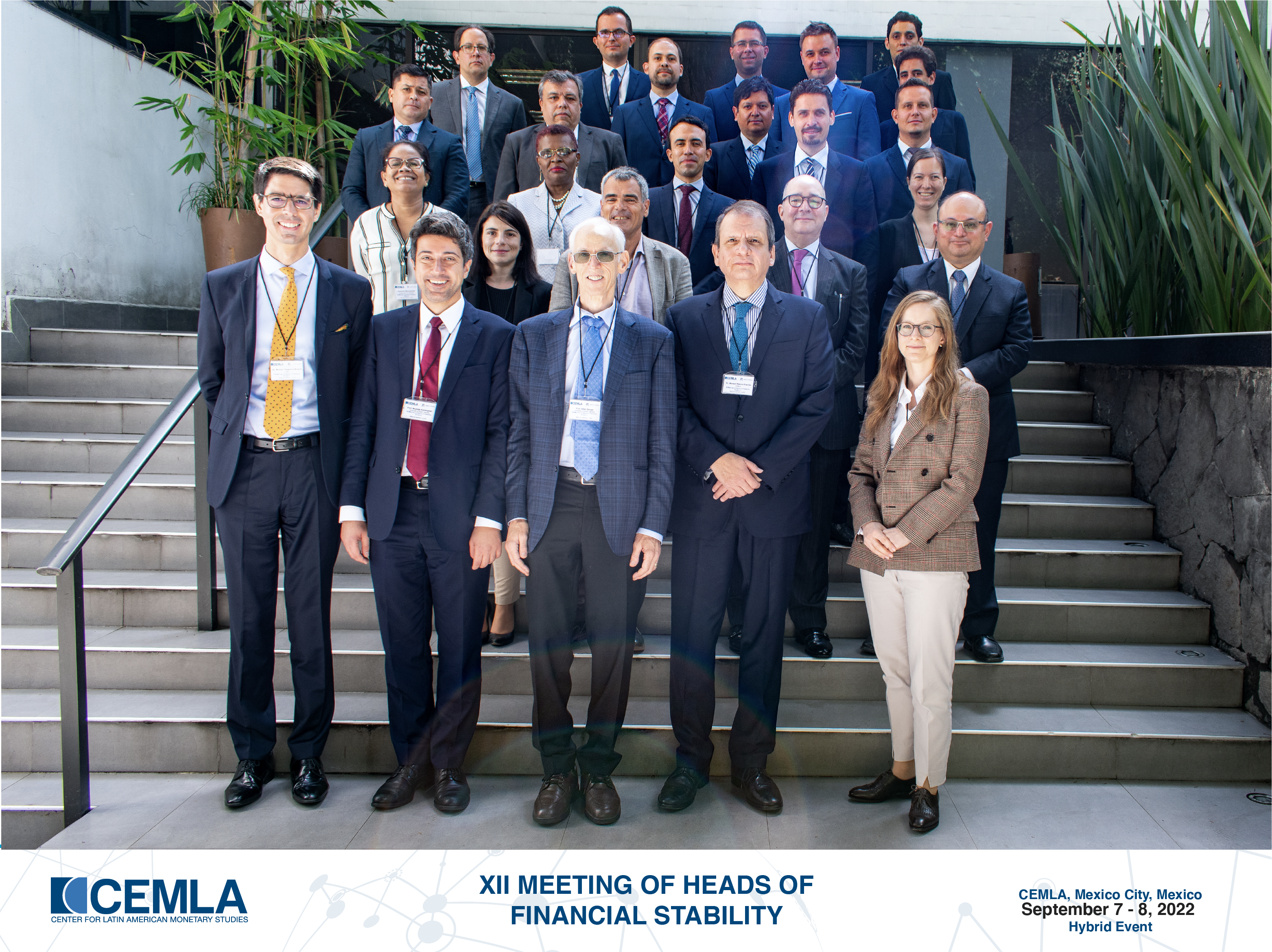

Disponible en
Español
![]()
XII Meeting of Heads of Financial Stability
September 7 - 8
Hybrid event
The meeting was held in hybrid format on September 07-08, 2022, in Mexico-City and was attended by 26 in-person and 62 virtual representatives from 32 institutions and associates of CEMLA, representing 22 Latin-American and Caribbean countries, United States and Canada, and 4 European countries.
The meeting was focused on the following topics: the economic and financial impacts of the Covid-19 crisis around the world, the consequences of shifts in international capital flows for financial stability in emerging economies, the potential impact of cyber risks on financial stability, and the implications of an uncertain geo-political and economic environment for financial stability policies. The agenda included a keynote session by Prof. Allen N. Berger, Carolina Distinguished Professor of Banking and Finance at the University of South Carolina, Prof. Mustafa Karakaplan, University of South Carolina and Raluca A. Roman, Senior Financial Economist at the Federal Reserve Bank Philadelphia. The meeting ended with an open roundtable with brief speeches from in-person participants to discuss central banks' perspectives on the current most important threats to financial stability.
A recurrent theme of the meeting was the “known unknowns” of financial stability risks. Some of these unknowns result from changing economic conditions which put into question if known remedies still apply. The opening remarks from Dr Ramos Francia summarized these conditions as a new world of high inflation, high interest rates, and low potential growth. Another part of the unknows are due to a lack of data and forecasts about developments that grow in importance of the global and domestic financial landscape, for instance the dependence of the real economy on non-bank financial intermediaries (NBFIs) or the interconnection of the traditional financial system with crypto markets.
Some of the main takeaways include the following ones:
- The conference emphasized the importance of considering how the NBFI's growing market share may threaten financial stability. Increasing accountability and transparency in global financial markets is a key factor in ensuring financial stability.
- The interconnectedness between banks and open-ended investment funds constitutes an important transmission channel of shocks to the economy in some countries of the LAC region.
- Protection for the demand side (consumers and investors), as well as compliance with anti-money laundering rules by cryptoasset exchanges are some of the regulatory concerns facing cryptoassets.
- Data collection is important to assess the risk that new technology poses to financial stability.
- During the Covid-19 crisis, the special role of banks as relationship lenders in times of distress became apparent.
Prof. Allen N. Berger
Carolina Distinguished Professor of Banking and Finance at the University of South Carolina, Darla Moore School of Business
Allen N. Berger is the H. Montague Osteen, Jr., Professor in Banking and Finance in the Finance Department, Darla Moore School of Business, University of South Carolina since 2008. He is a University Carolina Distinguished Professor, co-director of the Center for Financial Institutions at the Darla Moore School of Business, and former Ph.D. coordinator of the Finance Department, 2016-2021. Outside the University, Professor Berger is 2022 president and conference program chair of the Financial Intermediation Research Society (FIRS), a global research organization, senior fellow at the Wharton Financial Institutions Center, and fellow of the European Banking Center, among other affiliations. He received a Ph.D. in economics from the University of California, Berkeley.
Prof. Mustafa Karakaplan
University of South Carolina, Darla Moore School of Business
Mustafa U. Karakaplan is a clinical assistant professor of finance in the Darla Moore School of Business at the University of South Carolina. His research has been published in leading peer-reviewed journals including the Journal of Productivity Analysis, and Empirical Economics. His current research interests include Banking, Financial Intermediation, FinTech, International Finance, Financial Markets, Econometric Programming, Forecasting, Predictive Analytics, and Machine Learning. He received his Ph.D. from Texas A&M University in 2012 and held appointments at Utah State University and Georgetown University.
Raluca A. Roman, PhD
Senior Financial Economist, Federal Reserve Bank Philadelphia
Much of Raluca’s research ― and a book she recently coauthored ― focuses on bank bailouts and bail-ins and how they fit together with 14 other policy tools. Her research has also expanded to interactions between banking and consumer finance since consumers play key roles in the economy. Raluca has published articles in the Journal of Financial and Quantitative Analysis; Management Science; Journal of Financial Intermediation; Journal of Money, Credit, and Banking; Journal of Corporate Finance; and Journal of Banking and Finance, as well as chapters in the Handbook of Finance and Development and Oxford Handbook of Banking. Previously, Raluca worked at the Kansas City Fed, UBS Investment Bank, and MasterCard International. Raluca has a Ph.D. in finance from the University of South Carolina.

